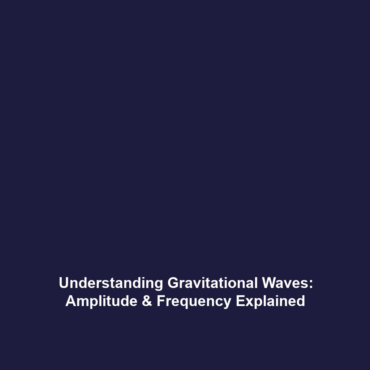Amplitude and Frequency of Gravitational Waves: Understanding Their Characteristics
Gravitational waves, ripples in spacetime caused by accelerating massive objects, are fundamental to our understanding of astrophysics. In the study of gravitational waves, amplitude and frequency serve as critical parameters that define their characteristics. Understanding these two aspects is essential as they influence the detection and interpretation of gravitational waves from astronomical events such as black hole mergers and neutron star collisions.
Key Concepts
The amplitude and frequency of gravitational waves relate to their energy and impact, and are described as follows:
Amplitude of Gravitational Waves
The amplitude of gravitational waves refers to the maximum displacement of spacetime from its equilibrium position. A higher amplitude indicates a stronger wave, typically resulting from more massive stellar events. This concept is crucial for the sensitivity of detectors like LIGO and Virgo, as it directly affects their ability to capture elusive gravitational signals.
Frequency of Gravitational Waves
Frequency, measured in Hertz (Hz), denotes how many wave cycles occur in one second. Gravitational waves can have various frequency ranges, from low-frequency waves generated by binary systems to high-frequency waves produced by more explosive events. The frequency informs researchers about the nature and distance of the source event.
Applications and Real-World Uses
The understanding of amplitude and frequency plays an important role in the practical applications of gravitational waves:
- Astrophysical Observations: Amplitude and frequency help in identifying the sources of gravitational waves, such as black hole mergers, improving our knowledge of cosmic phenomena.
- Testing General Relativity: Researchers use gravitational wave data to examine Einstein’s theories in extreme conditions, providing insights into the laws governing the universe.
- Cosmology: They aid in mapping the expansion of the universe through observations of cosmic events, highlighting how gravitational wave studies contribute to large-scale astrophysical understanding.
Current Challenges
Despite advancements, several challenges persist in studying the amplitude and frequency of gravitational waves:
- Detection Sensitivity: Current detectors may struggle to capture low-amplitude waves from distant sources.
- Noise Interference: Environmental noise can mask the signals, making it difficult to distinguish between genuine gravitational waves and background noise.
- Limited Frequency Range: Different detectors are optimized for specific frequency bands, restricting observations to certain types of gravitational waves.
Future Research and Innovations
Ongoing research focuses on enhancing the understanding of amplitude and frequency characteristics, which could lead to groundbreaking innovations:
- Advanced Detectors: The development of next-generation detectors, such as the Einstein Telescope, aims to improve sensitivity across a wider frequency range.
- Data Analysis Techniques: Enhanced algorithms and AI may improve the ability to filter noise and accurately interpret complex gravitational wave signals.
- Collaborative Observations: Future missions integrating multi-messenger astronomy will leverage gravitational waves in conjunction with electromagnetic signals for a richer cosmic picture.
Conclusion
In summary, the amplitude and frequency of gravitational waves are critical in understanding the characteristics of these cosmic phenomena. Ongoing research continues to shed light on their significance, offering insights into the universe’s fundamental workings. For readers eager to explore related topics, we recommend checking out our articles on How Gravitational Waves are Detected and Recent Breakthroughs in Gravitational Wave Astronomy.
